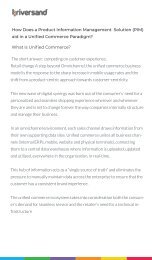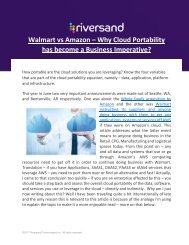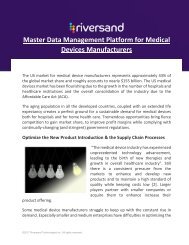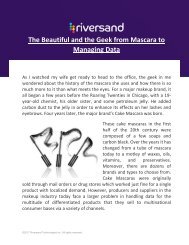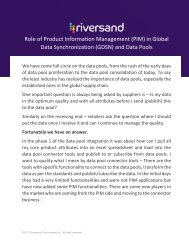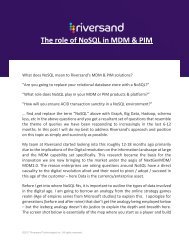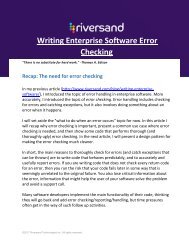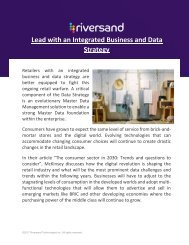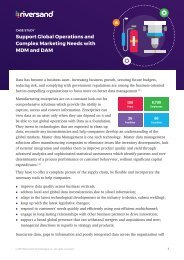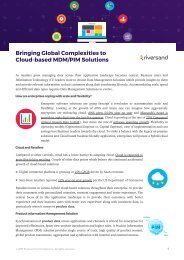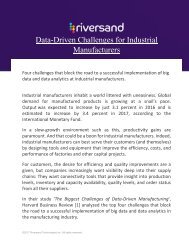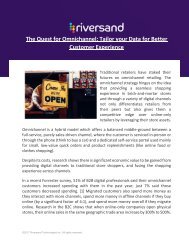Master Data Management For Industrial Manufacturers
An MDM solution serves as a hub for the enterprise data by integrating data from multiple sources (including legacy systems) into a single repository (the single ‘source of truth’) and help manufacturers to manage data related to products, customers, and distribution locations by sharing it across the business. An MDM solution works for both time-triggered and event-triggered systems, integrates easily with legacy systems and enables restricted access to various user groups through data governance rules.
An MDM solution serves as a hub for the enterprise data by integrating data from multiple sources (including legacy systems) into a single repository (the single ‘source of truth’) and help manufacturers to manage data related to products, customers, and distribution locations by sharing it across the business. An MDM solution works for both time-triggered and event-triggered systems, integrates easily with legacy systems and enables restricted access to various user groups through data governance rules.
Create successful ePaper yourself
Turn your PDF publications into a flip-book with our unique Google optimized e-Paper software.
<strong>Data</strong>-Driven Challenges for <strong>Industrial</strong><br />
<strong>Manufacturers</strong><br />
Four challenges that block the road to a successful implementation of big<br />
data and data analytics at industrial manufacturers.<br />
<strong>Industrial</strong> manufacturers inhabit a world littered with uneasiness. Global<br />
demand for manufactured products is growing at a snail’s pace.<br />
Output was expected to increase by just 3.1 percent in 2016 and is<br />
estimated to increase by 3.4 percent in 2017, according to the<br />
International Monetary Fund.<br />
In a slow-growth environment such as this, productivity gains are<br />
paramount. And that could be a boon for industrial manufacturers. Indeed,<br />
industrial manufacturers can best serve their customers (and themselves)<br />
by designing tools and equipment that improve the efficiency, costs, and<br />
performance of factories and other capital projects.<br />
<strong>For</strong> customers, the desire for efficiency and quality improvements are a<br />
given, but companies increasingly want visibility deep into their supply<br />
chains: They want connectivity tools that provide insight into production<br />
levels, inventory and capacity availability, quality levels, and order status<br />
from all their suppliers.<br />
In their study ‘The Biggest Challenges of <strong>Data</strong>-Driven Manufacturing’,<br />
Harvard Business Review [1] analyzed the top four challenges that block<br />
the road to a successful implementation of big data and data analytics in<br />
the manufacturing industry.<br />
©2017 Riversand Technologies Inc. All rights reserved.
Time-Triggered Versus Event-Triggered Control Systems<br />
Most of the today’s manufacturing is<br />
centered around stable technological<br />
systems based on pre-determined levels<br />
of demand.<br />
Usually, the production process is<br />
triggered by a specific demand schedule<br />
which is automatically fed into<br />
the ERPs and the manufacturing<br />
execution systems (MESs) which pull all<br />
the necessary resources from the supply<br />
chain. After the production ends, the<br />
finished product is packaged and<br />
shipped to the final customer through various distribution channels.<br />
The long-term aim of the manufacturing companies is to move on from<br />
these time-triggered systems towards more efficient event-triggered<br />
control systems where the company produces only when the customer<br />
orders the product. The factory will be required to respond to the data<br />
signal (the order) only when it occurs, allowing the company to utilize their<br />
capital efficiently and configure the systems to collect data and<br />
communicate it where and when needed.<br />
<strong>Data</strong> Sharing, Not Just <strong>Data</strong> Exchange<br />
Another significant challenge for<br />
the manufacturing enterprises is to<br />
create a unified data model and tie<br />
in together all the independent<br />
systems in the manufacturing<br />
process (starting with design,<br />
engineering<br />
production,<br />
distribution, and selling). <strong>Data</strong><br />
©2017 Riversand Technologies Inc. All rights reserved.
needs to be integrated and shared to every business unit in order to<br />
minimize the wasted materials and activities.<br />
An excellent example of system integration is how one drill manufacturer<br />
has been helping its customers — chemical plants, oil refineries, and other<br />
process manufacturers — operate their plants more effectively by<br />
leveraging IoT in the form of wireless drill sensors, which can detect<br />
potential failures in valves before they lead to a spill or shutdown.<br />
Handling Legacy Systems<br />
Introducing and integrating new technologies within well-established<br />
technical ecosystems can bring about new data challenges. These tend to<br />
arise not only when migrating information from one system to another,<br />
but also when trying to understand how older systems fit with the modern<br />
developments. The lack of a well-defined interface, proper<br />
documentation, and different programming languages could be a barrier<br />
towards smooth integration within the existing design and manufacturing<br />
environment.<br />
Security Challenges<br />
Lastly, all the systems which are interconnected via<br />
the Internet are susceptible to data breaches.<br />
This is not yet the case for industrial control<br />
systems, which often have unique protocols and<br />
limited computing power. Many of these systems<br />
were designed and installed at a time when<br />
industrial security was not a prime concern. They<br />
are connected via gateways that bridge the<br />
internet and the controlled device [1]. Still, these<br />
gateways need to be able to handle networking and security risks and be<br />
strong enough to avoid unauthorized access to data.<br />
©2017 Riversand Technologies Inc. All rights reserved.
If connected machines — the<br />
primary components of the<br />
Internet of Things (IoT) — are to be<br />
the backbone of industry in the<br />
near future, industrial<br />
manufacturers will have to figure<br />
out how to manage the data<br />
coming from an avalanche of<br />
sensors, integrated equipment and platforms, and faster information<br />
processing systems.<br />
An MDM solution<br />
An MDM solution serves as a hub for the enterprise data by integrating<br />
data from multiple sources (including legacy systems) into a single<br />
repository (the single ‘source of truth’) and help manufacturers to manage<br />
data related to products, customers, and distribution locations by sharing<br />
it across the business. An MDM solution works for both time-triggered and<br />
event-triggered systems, integrates easily with legacy systems and enables<br />
restricted access to various user groups through data governance rules.<br />
Read about how Top <strong>Industrial</strong> Producer uses Riversand’s<br />
MDMCenter to Achieve Global Repository Functionality Missing from<br />
Traditional ERP and Homegrown Systems<br />
Read 2017 <strong>Industrial</strong> Manufacturing Trends at pwc.smh.re<br />
Reference:<br />
[1] https://hbr.org/2016/05/the-biggest-challenges-of-data-drivenmanufacturing<br />
©2017 Riversand Technologies Inc. All rights reserved.
Riversand is an innovative leader in <strong>Master</strong> <strong>Data</strong> <strong>Management</strong>, powering industries from the world's<br />
largest to SMBs. Riversand's single integrated, scalable and robust multi-domain MDM platform caters<br />
to a variety of use cases across multiple verticals. In addition Riversand offers specific solutions such as<br />
Vendor Portal, Spare Parts <strong>Management</strong>, Material <strong>Master</strong>, GDSN on-boarding, Media Assets<br />
<strong>Management</strong>, Print Publishing etc. Business value which Riversand provides include accelerated timeto-market,<br />
increased sales, improved order accuracy, reduced costs and enhanced customer service.<br />
Customer satisfaction is at the heart of Riversand's innovation.<br />
<strong>For</strong> more information, visit Riversand.com and follow @RiversandMDM on Twitter.<br />
LEARN MORE<br />
©2017 Riversand Technologies Inc. All rights reserved.



